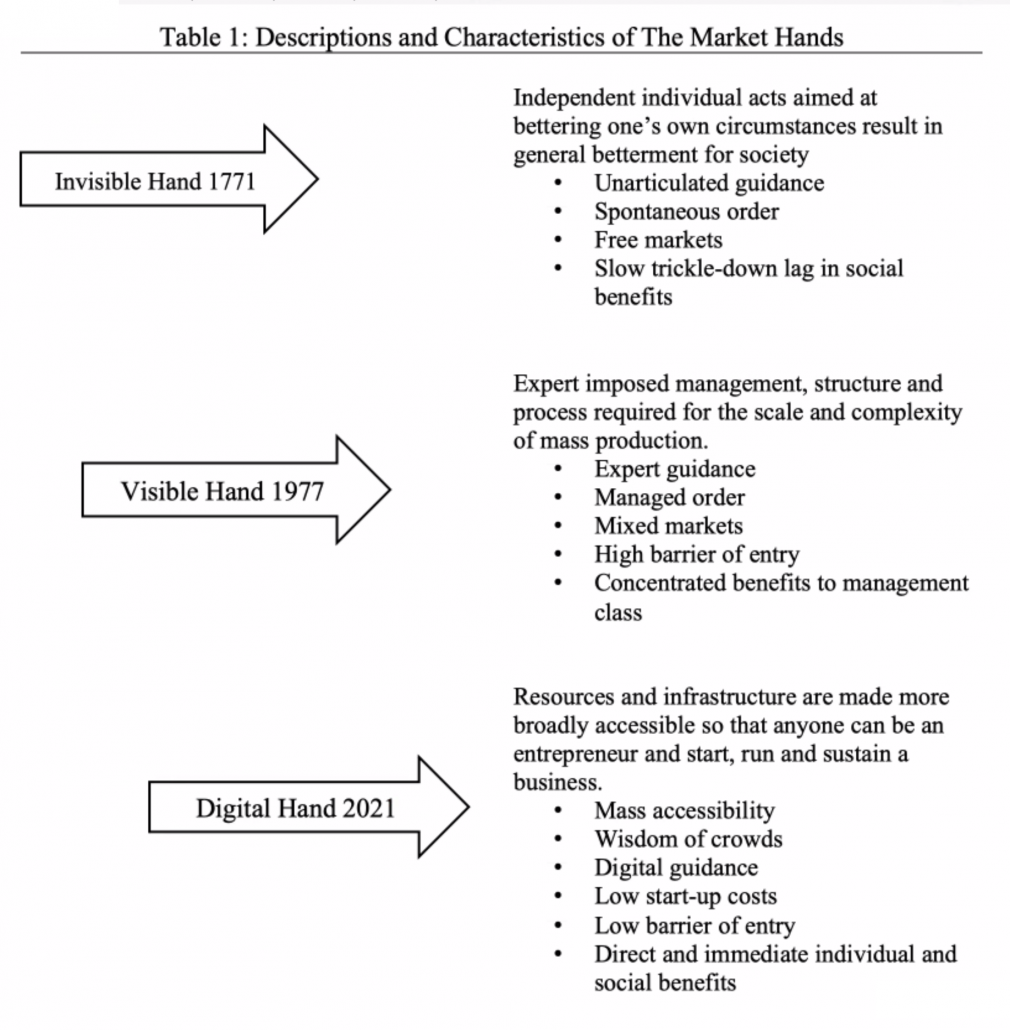The Emerging Institutions Of Entrepreneurship:The Rise Of The Digital Hand And The Emerging Class Of Digitalpreneurs.
In An Inquiry Into the Nature and Causes of the Wealth of Nations, Adam Smith described what he called the Invisible Hand – a metaphor to describe the mechanism of the market and the social benefit that individuals who participate in the market in self-interested ways intentionally and unintentionally serve others. The invisible hand guides individuals entrepreneurially to improve their own circumstances, and they unintentionally or unconsciously create social benefits for everyone by serving the ultimate purpose of creating markets, economic growth, trade and prosperity. The invisible hand guides individuals’ purposes to the most needed ends – the benefit that customers value most highly – and they express these purposes by using their skills and resources in market pursuits that benefit the larger society, intended or otherwise.
Alfred Chandler, on the contrary, took the opposite approach and described the visible hand, which he said was a managerial revolution. The visible hand guided the managerial class of large enterprises and replaced the spontaneous order of the invisible Hand with the visible hand of experts managing production, focusing on mass manufacturing and distribution. Alfred Chandler said, “Such internalization permitted the Visible Hand of administrative coordination to make more intensive use of resources invested in these processes of production and distribution than could the Invisible Hand of market coordination.” Chandler sought to replace the implicit guidance of the Invisible Hand with the explicit control of an elite management class and the tools of organizational structure, command-and-control methods and tightly constructed processes.
We are seeing the results of the visible hand today, in the rigid structures of established businesses that struggle to respond to fast-paced change and rapid innovation, and also in the rejection of business by younger generations who see it as elitist and exploitative.
Happily, the visible hand is losing its grip. Today, what I see emerging is the Digital Hand.
As the Table indicates, the digital hand is the enablement of a broad and deep population of new entrepreneurs who have easy access to infrastructure and resources available via the internet and who can connect to every available source of knowledge, expertise and support. The digital hand opens economic opportunities for everyday people who can participate as entrepreneurs in today’s economic marketspaces. Ecommerce and digital marketspaces are giving rise to digitalpreneurs, both nationally and globally. Chandler’s visible hand has made significant improvements in the production of economic goods and mass service offerings, no doubt. However, never in human history has there been a digital hand guiding individuals who offer services, products, and entertainment, with the power of prosperity except in this current time of mass accessibility of eCommerce platforms.
Recent data suggests that social e-platforms, digital stores, and online marketspaces are a $200 billion industry. The cause of this boon is the result of human action and not of human design; the effect is the opportunity for regular people – not Chandler’s elite – to be guided to economic success by the digital hand. Now brick-and-mortar business models can be offered through a digital marketspace or a hybrid of both click-and-mortar. One person startups or small teams or small and medium sized businesses can harness the virtually unlimited resources of the digitally interconnected global economy and serve its digitally interconnected markets.
Is the entrepreneurial participation of everyday people using digital platforms via the digital hand the final, irreversible shift to free and unhampered markets? Is the level of ease for the average person to be involved in the market process the great breakthrough for individual economic freedom, even though their investment in entrepreneurial endeavors is not as consequential as an investment of a high-profile millionaire or billionaire? In the short run, we see more real people – you, your neighbor, and your friend – profitably exercising their talents, serving consumers, using the digital hand. In the long run, an entire emergent class of individuals can realize their positive impact on society using the digital hand.
With a tremendous uptick in digital businesses opportunities within the past decade, there is anticipation that more digitalpreneurs will arise in the future, thereby expanding this class of entrepreneurs. Facebook’s Marketplace has grown to millions of sellers across many countries, providing real people with enormous entrepreneurial and innovative opportunities within just a few years of its formation in the digital space. No matter the division of labor one represents in the eCommerce sphere, there are sufficient and inexpensive marketspaces to enable the expression of entrepreneurship. Poshmark, eBay, Etsy, Shopify, Volusion, and other eCommerce marketspaces have built-in buyer networks serving millions of people. These e-platforms remove arbitrary barriers to the advancement of everyday people who wish to participate in the marketspace. Digitalpreneurs, newcomers, or entrepreneurs transitioning to digital platforms develop entrepreneurial skills and can profit from them.
Not only that, digitalpreneurs have noticeable positive effects on value-creation for customers and motivation for sellers. Value in a subjective sense can exchange for digitalprenuers’ presented value.
Digitalpreneurs provide a subjectively valued service, and in response, the value is immediately returned to the digitalpreneur based on the service obtained by the consumer. The consumer, pays the digitalpreneur according to the value of the service received. The digital hand, like the invisible hand guide, rewards people who are efficient in filling market gaps. Unlike the visible hand, the digital hand uses the knowledge and experiences of many, which is what F. A. Hayek called dispersed knowledge, so that value can only be exchanged for what it is perceived in worth. The upside to the digital hand is that there is always something for somebody in the vast marketspace.
Therefore, the effect of open marketspaces is the emergence of an entrepreneurial class who are nimble and fast-acting by their very nature. The class of digitalpreneurs individualizes marketspace levels of participation across diversified products and services or both.
Ultimately e-platforms and digital marketspaces are creating a process whereby real people with various levels of investment in the economy can do good. How long will this last? While the youngster creating skateboards to sell on social marketspaces and digital apps is not investing at the amounts of an Elon Musk or Daymond John, he or she is nevertheless engaging in entrepreneurship using the digital hand. The retired musician can use the digital hand to stream music lessons to people who live thousands of miles away or someone next door. Up and rising musicians may not sell as many records as Druno Mars, Carrie Underwood, or Rihanna but they can be heard across various countries by listeners and admirers with one swipe across the smartphone screen. The aspiring musician can receive the face value of their streaming services. Using resources, serving consumers while making a profit, saving and reinvesting, and future growth –isn’t this what entrepreneurship is about? With the digital hand, producers can produce more, and consumers can choose far more options from rising producers or artists who choose to use their superior offerings and talents to contribute to society’s workings.
The digital hand in the short run ought to increase individuals’ entrepreneurial freedom, thereby creating an emerging class. In this regard, I think Ludwig von Mises said it best, “The meaning of economic freedom is this: that the individual is in a position to choose the way in which he wants to integrate himself into the totality of society.” There are positive short and long run effects emanating from this digital class of entrepreneurs yet to be seen.
Raushan Gross, Ph.D. is Associate Professor of Business Management at Pfeiffer University.













